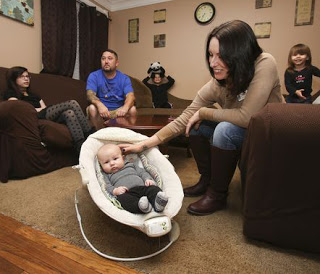Drug-addicted babies more than twice as likely in Kentucky as in rest of nation, but few facilities accept addicted pregnant women

A baby born in Kentucky is more than twice as likely to be addicted as a typical baby born elsewhere in the United States.
In 2013, the last year for which comparative figures are available, Kentucky had 15.1 cases of addiction per 1,000 live births; the national rate was 7.3, according to a research letter in the journal JAMA Pediatrics.
“Both were up substantially from five years earlier, and Kentucky’s rate jumped another 40 percent the following year,” reports Laura Ungar of The Courier-Journal.
“We have mothers who are addicted throughout pregnancy and their addiction is more or less passed down to their babies,” researcher Joshua Brown, of the Institute for Pharmaceutical Outcomes and Policy at the University of Kentucky, told Ungar. “The trend just keeps going up and up and up.”
Addicted babies are one product of the state’s issues with drugs, legal and illegal. “We’ve had one of the country’s worst prescription drug problems,” institute director Jeffrey Talbert told Ungar. “We need more treatment providers and more access to care.”
Especially for addicted mothers or mothers-to-be: “Only 30 of the 123 substance-abuse treatment facilities in Kentucky accept pregnant or post-partum women,” Ungar reports. “Only eight are long-term residential programs.”
“There are signs of progress,” Ungar reports. “In 2015, Kentucky became one of 11 states to receive up to $3 million in federal grants to provide expanded treatment to pregnant addicts. That was in addition to $1 million in state funds for transitional care and other services that came from an appropriation in the anti-heroin bill passed that year. And on Wednesday, state officials announced they will apply for up to $10 million in federal … funding to fight the opioid epidemic, and one of their priorities if they get it will be to help pregnant addicts.”
A law co-sponsored by Senate Majority Leader Mitch McConnell of Kentucky “calls for, among other things, spreading proven practices to prevent and treat maternal opioid abuse and recommendations for treating drug-dependent infants,” Ungar notes.
